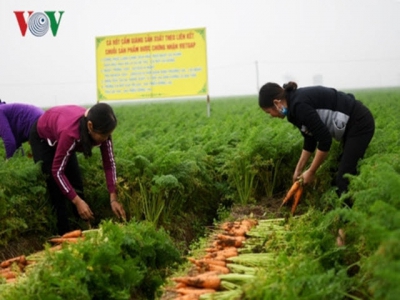Boosting links – key to increasing Vietnams farm produce exports

Linking production with processing and market demand has become a key task of the agriculture and rural development sector. The sector aims to earn 43 billion USD in export revenue this year.
Carrot farm in Duc Chinh village, Hai Duong province (Photo: Minh Long/VOV)
Vietnam's achievements in the agriculture sector last year were attributed to a joint effort by businesses, cooperatives, and policymakers to coordinate in production with processing in farming, husbandry, and aquaculture.
Despite technical barriers set by demanding markets in the US, Japan, and the EU, Vietnam earned a record 40 billion USD from agro-forestry-fishery products last year, up 3.1%.
By boosting cooperation, more opportunities have been created for enterprises, farmers are encouraged to join cooperatives, and farm incomes boosted.
Nguyen Duc Menh, director of Tan Huong Farm Produce and Food Processor in Hai Duong province, said his company buys hundreds of thousands of tons of vegetables and fruits each year for export and domestic consumption. Many of its products are sold in Japan and the Republic of Korea.
Menh said: “We have been working with cooperatives to create a separate material zone. Early this year we signed a contract to send 500 tons of farm produce to Japan and more than 100 tons to the Republic of Korea. Food safety is essential for agricultural exports, especially to markets with strict quality requirements.”
Nguyen Quoc Toan, Acting Director of the Farm Produce Processing and Market Development Department, said with sufficient investment in agriculture, enterprises can earn higher profits.
He said it’s important to build trust, create a transparent business environment, and remove hurdles in land clearance to strengthen agricultural restructuring.
16 large companies invested nearly 370 million USD in the fruit processing sector last year. 17 processing plants with a total investment of 430 million USD were either opened or begun. Toan said: “Vietnam’s agricultural production should use value chains to meet international integration requirements. Vietnam also needs to improve processing quality and links between producers and processors. To increase export revenue, exporters need to keep up to date on regulations and technical barriers set by importing countries."
Minister of Agriculture and Rural Development Nguyen Xuan Cuong called on farmers to increase their links with processors and traders. He said: “We should promote value chain to establish concentrated material zones. Technology should be used to maximize productivity and minimize costs. Safe, qualified materials are the foundation of sustainable business for processing companies. An appropriate production model should be developed based on value chains and market signals to avoid lingering low prices after a bumper crop.”
Cuong said the sector has targeted 3% growth this year and will strive to earn 43 billion USD in export revenue, hoping to become one of the world’s 15 countries and territories to have the most developed agricultural industry within a decade.
Related news
 Hi-tech innovation revolutionises a Limpopo citrus farm
Hi-tech innovation revolutionises a Limpopo citrus farm When Stefan and Anné Pretorius established Katlego Sitrus more than a decade ago, they decided to re-evaluate everything they knew about farming
 Strict import requirements usher in changes to agricultural production
Strict import requirements usher in changes to agricultural production Tough quality requirements laid down by major importers are pushing local agricultural firms and farmers into changing their methods of production whilst
 Farmers Scientist in northwestern mountains
Farmers Scientist in northwestern mountains Hanh has helped many farmers in Vietnam’s northwestern mountains improve their production with his innitiatives and new techniques.